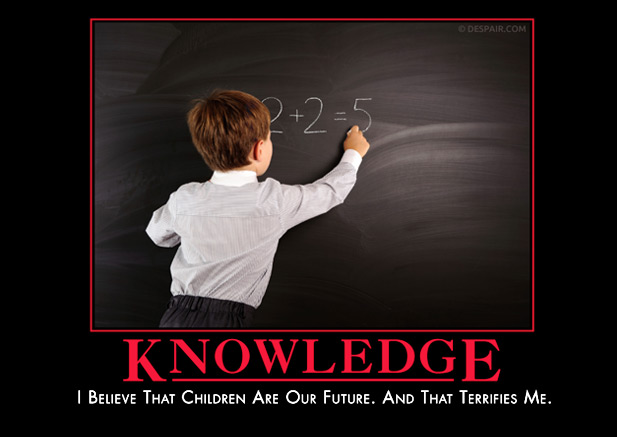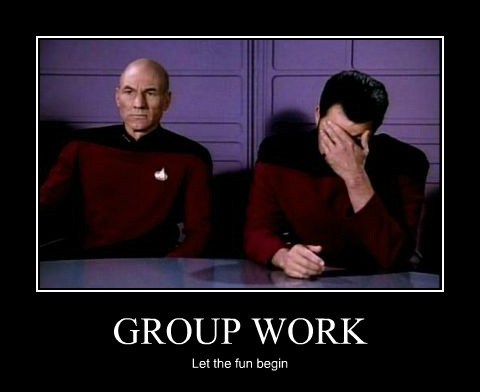 There is a good case to be made that part of our job as educators is to prepare students for the ‘real world’ – whatever that is. We could thus argue that deadlines and responsibility are valid goals of public education. In the ‘real world’, you’re expected to do stuff when it needs to get done. Rolling in at 3 p.m. with “hey, here are those burgers you asked for during the lunch rush” isn’t going to cut it, nor will you get paid half if you simply don’t make them at all.
There is a good case to be made that part of our job as educators is to prepare students for the ‘real world’ – whatever that is. We could thus argue that deadlines and responsibility are valid goals of public education. In the ‘real world’, you’re expected to do stuff when it needs to get done. Rolling in at 3 p.m. with “hey, here are those burgers you asked for during the lunch rush” isn’t going to cut it, nor will you get paid half if you simply don’t make them at all.
Unfortunately, we can just as vigorously argue that in many cases, not getting something done on time at work doesn’t mean you don’t still have to do it – you’re just in hot water while you do.
Either way, I’m not personally organized enough to make that case. Anyone who’s ever had to get paperwork from me knows what a challenge that can be – despite my best intentions.
The thing is, there are many less noble, smaller scale reasons for due dates and deadlines and policies regarding late work. Not surprisingly, many of them come down to the realities of teaching public school rather than the sorts of grander ideals we usually proffer when challenged.
Most of you are familiar with ‘economies of scale’. We teach kids in large batches mostly because we can’t afford to do it in small, or individually.
I do my best to come up with lessons that have a reasonable chance of reaching a majority of my 151 students while allowing some wiggle room in terms of quality and individual strengths and such. I’m not complaining – I love my job – but this is enough to keep me pretty busy most days and for several hours on the weekend.
 And no matter how modern or flipped or inquiry-based I may try to be, there are still things that require grading. I hate grading, but there’s a limit to how much I can job out to students and still be able to sleep at night. There are things they can learn from peer evaluation, but half-a-class spent announcing that #1 is A, #2 is C, etc., is an embarrassing waste of limited time. Besides, most of what I’m grading isn’t multiple choice.
And no matter how modern or flipped or inquiry-based I may try to be, there are still things that require grading. I hate grading, but there’s a limit to how much I can job out to students and still be able to sleep at night. There are things they can learn from peer evaluation, but half-a-class spent announcing that #1 is A, #2 is C, etc., is an embarrassing waste of limited time. Besides, most of what I’m grading isn’t multiple choice.
So when I hear repeatedly from otherwise respected voices that it really shouldn’t matter WHEN students do the assigned reading, master the required skill, absorb the expected content, as long as they GET it some day in their own special time and way – my shoulders tighten and my stomach hurts. I appreciate the theory, but education reformers and ideologists aren’t known for being bound by the same reality as the rest of us.
If reforms were horses, then students would ride… and teachers would walk behind them in the parade.
It’s time and energy-intensive to grade 150 of anything – paraphrases, thesis sentences, artsy fartsy projects, whatever. It’s FAR more time and energy-intensive when the stack you’re grading is a mix of everything you’ve done so far that semester – some clearly marked and easy to evaluate, some requiring you revisit the rubric you used or the instructions you gave. Some things you’re not actually sure what they are – so you read over them a few times trying to connect them with something you assigned in the past six months.
Yes, I know the answers to the quiz – but I don’t memorize the letters. Of course I can just read each question and its possible responses – but it takes much, much longer. And the writing… sometimes the priority is content, sometimes the priority is the formulation, sometimes something else. I’m so glad you finally turned this in, but I don’t have instant recall of every discussion in every class at every step as we worked through the process, or what priorities I may have suggested you personally focus on three weeks ago when you first asked to redo this particular prompt.
 Yeah, yeah – poor overworked teacher. But this isn’t about me missing my tee time after school. What it means instead is that when I am working, at my desk or at home, I’m spending far more time and energy trying to figure out why little Johnny has handed in a page of Level Questions over some – well, over SOMETHING, I’m not sure WHAT – and whether or not they correspond to anything he’s missing in the gradebook – than I’m spending coming up with better ways to teach Johnny’s 150 peers the next unit. Flexible deadlines and nurturing late work policies mean I spend more time grading than preparing, or teaching, or collaborating, or whatever.
Yeah, yeah – poor overworked teacher. But this isn’t about me missing my tee time after school. What it means instead is that when I am working, at my desk or at home, I’m spending far more time and energy trying to figure out why little Johnny has handed in a page of Level Questions over some – well, over SOMETHING, I’m not sure WHAT – and whether or not they correspond to anything he’s missing in the gradebook – than I’m spending coming up with better ways to teach Johnny’s 150 peers the next unit. Flexible deadlines and nurturing late work policies mean I spend more time grading than preparing, or teaching, or collaborating, or whatever.
And there are other ways to assess – I’m not trying to run us all to the other extreme. Just trying to tie a little string to the kite of late work reform.
Expecting students to more or less keep up is not just about my personal space-time continuum. Remember how bookwork and lectures are the devil and all learning should be in groups, because collaboration is the new god? It’s difficult to really ‘collaborate’ if not everyone has done the required preparation – read the same chapters or worked through the same prompts or tried the same individual activities to get them to the point they have anything useful to say to or gain from one another.
It’s not about all having the same abilities or all achieving at the same level – it’s actually even better if they bring DIFFERENT things to the group. But do we seriously want all group work to be the two prepared kids once again dragging everyone else through the basics just because 2/3 of the group didn’t feel inspired to learn at their own pace and in their own special way that week?
 How many angry lil’ Republicans are created this way – barely into high school and already learning that the harder they work, the more they are expected to drag along those who can’t or won’t, often at the expense of their own progress? At least under the old framework the best and brightest were merely ignored and marginalized under the assumption they’d still pass state tests and stay out of discipline trouble – under this new approach we can actively punish them for being responsible!
How many angry lil’ Republicans are created this way – barely into high school and already learning that the harder they work, the more they are expected to drag along those who can’t or won’t, often at the expense of their own progress? At least under the old framework the best and brightest were merely ignored and marginalized under the assumption they’d still pass state tests and stay out of discipline trouble – under this new approach we can actively punish them for being responsible!
Which, I suppose, IS part preparing them for ‘the real world’, now that I think of it.
I don’t know how to make good use of class time without the expectation students will arrive prepared. I don’t know how to have a class discussion, build a logical curriculum sequence, structure activities, select reading, or even insert movies if I’m supposed to be OK with half the class working at whatever lil’ pace their specialness allows. I’m hardly inflexible – no two years play out in quite the same way or at the same pace – but I am bewildered by the suggestion that I should deliberately hold off on judging little Barclay until the last week of May when suddenly I simply must give him a grade indicating what he’s done or learned that year.
I appreciate the suggestion we could stand to be more accommodating of students’ various needs. I realize the assumption behind much reform is that I’m an inflexible fascist who enjoys crushing the young no matter how intensely they strive for success. That is, after all, the primary reason to teach – along with my desire to maintain low standards and have no personal accountability, of course.
I respectfully suggest, however, that we’re not doing them any great favors by teaching them that the most important question they can pose along their learning journey is “when are the retakes?”
Related Post: He Tests… He Scores!

 On April 27th, 2014, the Dallas Stars were only a few game minutes away from an improbable 4-2 home victory over the conference-leading Anaheim Ducks. It had been a storybook game with glorious hits, highlight reel scoring, and the sort of scrap and grit that made the Stars (rather than their opponents) the Disney-movie-ready heroes – IF they could tie up this best-of-seven series and force their way back to Anaheim for a final brouhaha.
On April 27th, 2014, the Dallas Stars were only a few game minutes away from an improbable 4-2 home victory over the conference-leading Anaheim Ducks. It had been a storybook game with glorious hits, highlight reel scoring, and the sort of scrap and grit that made the Stars (rather than their opponents) the Disney-movie-ready heroes – IF they could tie up this best-of-seven series and force their way back to Anaheim for a final brouhaha. By what should one measure success in professional hockey? It’s so relative, and it matters deeply where you started, what adversities you’ve faced, how much support you’ve had, how much talent you have to work with, Finances matter, and sometimes there’s a fair amount of luck involved.
By what should one measure success in professional hockey? It’s so relative, and it matters deeply where you started, what adversities you’ve faced, how much support you’ve had, how much talent you have to work with, Finances matter, and sometimes there’s a fair amount of luck involved. I’ll go back to my hockey analogy, mostly because it’s easier to find supporting visuals that way. How do we measure success in a specific game? Not just for the team, but for the individual stu– er… players? What do we measure and thus value in hockey?
I’ll go back to my hockey analogy, mostly because it’s easier to find supporting visuals that way. How do we measure success in a specific game? Not just for the team, but for the individual stu– er… players? What do we measure and thus value in hockey? But the other team is trying to score also. Huh. OK, OK… if you’re on the ice when your team scores a goal, that’s +1 for you. If you’re on the ice when the other team scores on you, that’s -1. Keep a running total, and it’s clear: the higher your +/-, the better player you are. So, like, Sidney Crosby finished the season at +18. That’s pretty good. Down from +26 last season, but there were other factors, because –
But the other team is trying to score also. Huh. OK, OK… if you’re on the ice when your team scores a goal, that’s +1 for you. If you’re on the ice when the other team scores on you, that’s -1. Keep a running total, and it’s clear: the higher your +/-, the better player you are. So, like, Sidney Crosby finished the season at +18. That’s pretty good. Down from +26 last season, but there were other factors, because – Wait – that can’t be right. Alex Ovechkin is one of the best-known and most valuable players in the league. Is that a typo? And Seth Jones – he’s going to be great. Young kid out of Dallas, playing for Nashville – I mean, what he DID this year for his age and background!
Wait – that can’t be right. Alex Ovechkin is one of the best-known and most valuable players in the league. Is that a typo? And Seth Jones – he’s going to be great. Young kid out of Dallas, playing for Nashville – I mean, what he DID this year for his age and background! You have a goalie with a great save percentage. That’s awesome – that is, in fact, their primary job. How many games is that percentage based on? In what circumstances did he play? He may be on a team that could pretty much leave their net empty and have no worries because their defensive play is so strong. On the other end of the ice, though, is a goalie working miracles but losing games because the team sucks. So save percentage is an important number, but not nearly as simple as it first appears.
You have a goalie with a great save percentage. That’s awesome – that is, in fact, their primary job. How many games is that percentage based on? In what circumstances did he play? He may be on a team that could pretty much leave their net empty and have no worries because their defensive play is so strong. On the other end of the ice, though, is a goalie working miracles but losing games because the team sucks. So save percentage is an important number, but not nearly as simple as it first appears.
 I believe it was Winston Churchill who said that our current grading system is the worst one there is except for all of the other systems that have been tried (I might have the details a little fuzzy). The thing is, we haven’t really tried that many others. And yes, I realize as soon as we open that door, there are huge arguments to be had about what we should measure and how and yada yada yada.
I believe it was Winston Churchill who said that our current grading system is the worst one there is except for all of the other systems that have been tried (I might have the details a little fuzzy). The thing is, we haven’t really tried that many others. And yes, I realize as soon as we open that door, there are huge arguments to be had about what we should measure and how and yada yada yada. 